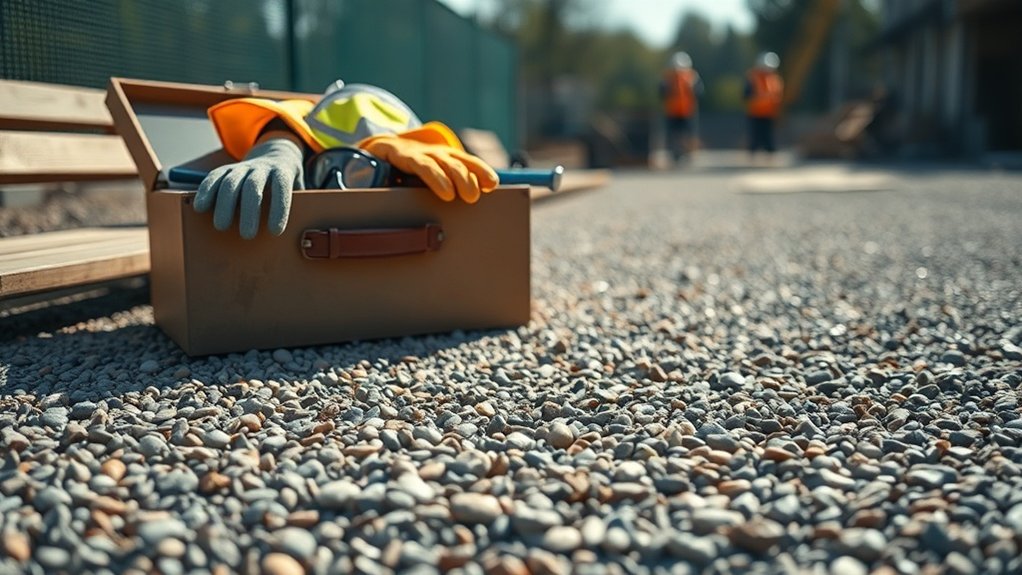To comply with resin-bound gravel safety regulations, ensure adherence to REACH guidelines and complete the required training on diisocyanates for safe handling. It’s essential to prioritise BBA certification and follow FeRFA guidelines for quality assurance. Add anti-slip additives and maintain drainage systems to boost safety and performance. Conduct regular audits and inspections to confirm compliance and material quality. By focusing on these areas, you can effectively navigate safety requirements and enhance the integrity of your installations. Look into more efficient strategies for compliance.
Key Takeaways
- Ensure all employees handling diisocyanates undergo mandatory safety training and refresh this training every five years to comply with REACH regulations.
- Obtain BBA certification for resin-bound products to confirm their durability and adherence to industry standards, with regular assessments every three years.
- Carry out comprehensive durability testing, including checks for weathering resistance and slip resistance, to ensure materials meet safety and performance criteria.
- Use anti-slip additives and maintain surface integrity to improve safety and prevent accidents; conduct routine maintenance checks.
- Install permeable surfaces with effective drainage solutions to manage rainwater and lessen environmental impact, using sustainable materials where possible.
Understanding REACH Regulations and Diisocyanate Training
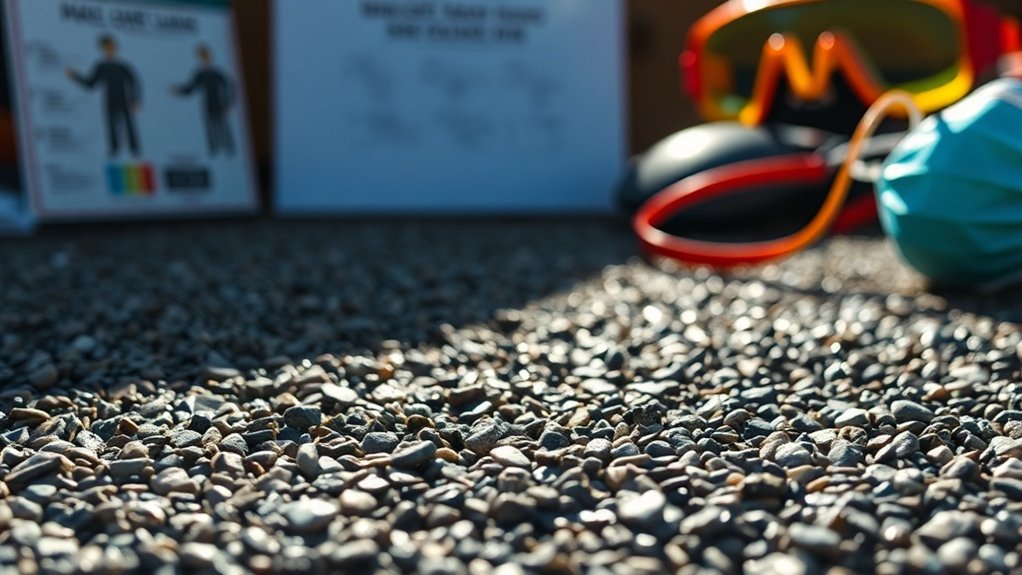
Understanding REACH regulations and diisocyanate training is crucial for anyone involved in making polyurethane products. Diisocyanates can pose significant hazards, particularly regarding respiratory issues and skin sensitisation. Therefore, all employees dealing with substances that contain more than 0.1% diisocyanates must undergo compulsory training. This training should cover safe handling practices, emergency procedures, and the specific risks associated with your role. Additionally, the concentration limit ensures that diisocyanates are used safely in industrial and professional settings. Remember, this training needs to be refreshed at least every five years to ensure ongoing compliance and competency. Suppliers are responsible for clearly communicating these training requirements and providing access to necessary resources.
Importance of BBA Certification and FeRFA Guidelines
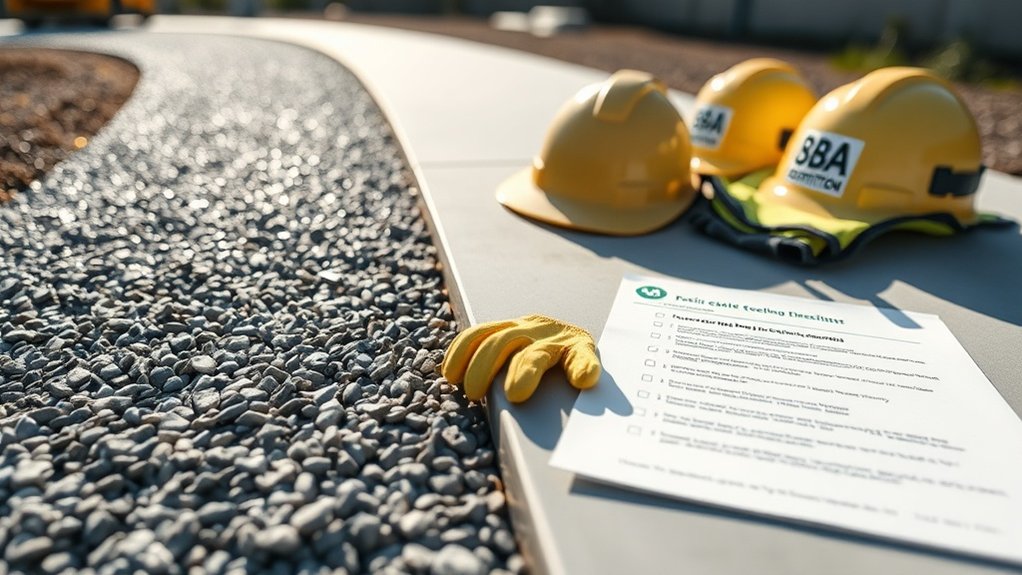
BBA certification and FeRFA guidelines are crucial for maintaining quality in resin bound installations. They ensure thorough durability testing and compliance with industry standards. By following these guidelines, you can improve safety and reliability in your projects, giving clients peace of mind. For example, a properly certified installation can withstand harsh weather conditions, reducing the risk of damage and the need for costly repairs. Additionally, adherence to REACH Regulations ensures that materials are handled safely, further protecting both workers and the environment. Implementing British Standards Institution guidelines also enhances project outcomes, ensuring that installations meet essential safety and longevity benchmarks.
Ensuring Quality Standards
To ensure quality in resin-bound installations, it’s important to understand the role of BBA certification and FeRFA guidelines. Following these standards leads to safe and dependable results.
Here are some key points to remember:
- BBA Certification ensures your resin choice has passed rigorous strength and durability tests.
- FeRFA Guidelines outline the best practices for installation, including the correct mixing ratios.
- Regular Monitoring of BBA certification, which occurs every three years, ensures continued compliance with performance standards and confirms the validity of certificates. Additionally, adhering to Sustainable Drainage Systems (SuDS) requirements enhances drainage performance.
- Quality Assurance checks in line with FeRFA build client trust and meet necessary regulations.
Durability Testing Procedures
Durability testing procedures are crucial for ensuring the long-term performance of resin-bound gravel surfaces. These tests assess weathering resistance, wear, UV exposure, and mechanical stress over time.
By conducting durability tests, you can confirm the structural integrity and aesthetic appeal of the surfaces, which are key for public safety and maintaining value.
To effectively simulate real-world conditions, it’s important to carry out both laboratory and field tests on installed samples. Regular spot checks and maintaining batch consistency records throughout the project are essential for quality assurance.
Additionally, thorough documentation of all testing results and procedures is vital for audits and compliance verification. Following BBA certification and FeRFA guidelines will further bolster your project’s credibility. Moreover, consistent moisture testing is vital for maintaining resin performance and avoiding production issues.
Compliance With Industry Regulations
Ensuring compliance with industry regulations is crucial for the successful installation of resin-bound gravel systems. Understanding the significance of BBA certification and FeRFA guidelines can help you navigate compliance challenges effectively. Here are the key points to consider:
- BBA Certification: This certification confirms that products have undergone rigorous testing and meet UK standards, which enhances their credibility.
- Regular Audits: To maintain certification, regular audits are necessary. This ensures ongoing quality and performance of the materials used.
- FeRFA Guidelines: These guidelines provide best practices for selecting materials and installation methods, which promote the longevity of your project.
- REACH Regulations: Compliance with these regulations is vital for health and safety, as they require proper training for handling hazardous substances like diisocyanates.
Neglecting these regulations can lead to installation failures and potential legal issues.
Ensuring Slip Resistance for Safety
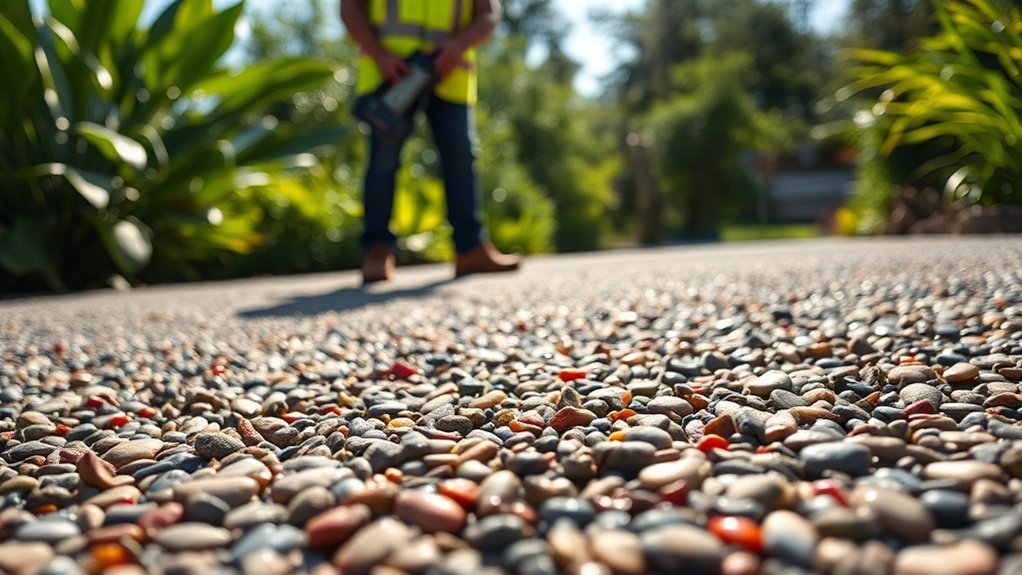
To ensure slip resistance, consider adding anti-slip additives to your surfaces. These improve grip while keeping the look appealing.
Regular testing of surfaces is crucial to ensure they meet safety standards and provide optimal traction. Additionally, routine maintenance helps maintain slip-resistant properties over time, which can significantly reduce the risk of accidents.
For example, using anti-slip coatings in wet areas like bathrooms or kitchens can be particularly effective.
Importance of Anti-Slip Additives
The role of anti-slip additives in resin-bound surfaces is crucial for safety, especially in areas prone to slips and falls.
Here are some key benefits:
- Crushed glass enhances surface friction, making it more durable.
- Fine sand adds texture, particularly on slopes, which boosts grip.
- Angular aggregates create a rougher surface, significantly improving skid resistance.
- Topical anti-slip powders offer an additional non-slip layer during installation.
Incorporating these additives is essential for ensuring safer environments.
Regular Surface Testing
Regular surface testing is crucial for ensuring slip resistance in resin-bound surfaces. Conduct slip resistance tests at least once a year or after any modifications, repairs, or seasonal changes. This is particularly important for surfaces exposed to oil, dust, or other contaminants.
Always perform tests under both dry and wet conditions, as wet surfaces can significantly reduce slip resistance.
Factors such as temperature, humidity, and surface wear can affect test outcomes, so plan your testing schedule accordingly. Use standard methods like the Pendulum Test or Ramp Test to ensure compliance with safety regulations.
Understanding PTV, R-classifications, and DCOF values is essential for maintaining a safe environment for pedestrians.
Maintenance for Traction
Maintaining traction on resin-bound surfaces is crucial for safety and preventing slips. To effectively enhance surface grip, consider these straightforward strategies:
- Regular Sweeping: Frequently remove dirt, leaves, and organic debris to ensure a firm grip.
- Gentle Washing: Clean the surface with a garden hose or low-pressure washer to avoid damaging the aggregate.
- Anti-Slip Additives: Sprinkle crushed glass or sand to boost traction.
- Inspect for Damage: Regularly check for wear and cracks that could undermine grip.
Complying With Drainage and Suds Regulations

To ensure compliance with drainage and SUDS regulations, focus on installing permeable surfaces that effectively manage rainwater.
Resin-bound gravel is a great option as it allows water to soak through, reducing surface runoff. Make sure your resin-bound system is laid over a permeable sub-base, such as open graded porous tarmac or type 3 stone, to enable proper drainage.
If you’re installing it over non-permeable bases, you’ll need additional drainage solutions, like ACO drains or vertical piping. Properly sloping the base layer helps direct water to drainage points, preventing pooling.
Implementing Safe Installation Procedures
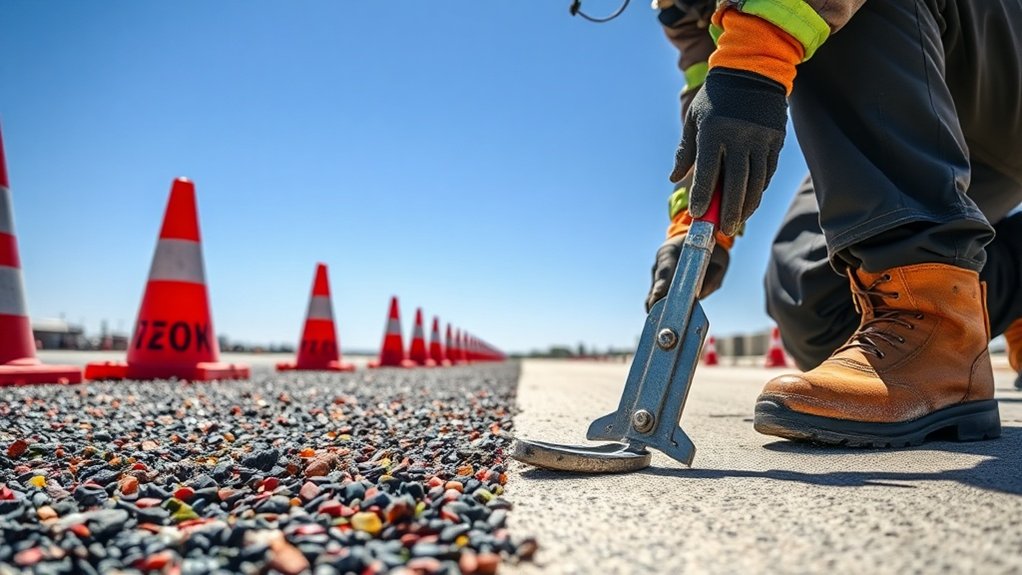
When implementing safe installation procedures, a thorough site assessment is essential to prevent future issues.
Follow these key steps for effective surface preparation:
- Survey the site: Assess slopes, drainage points, and existing conditions before starting.
- Excavate properly: Dig to the recommended depth of approximately 150mm and install a compacted sub-base for stability.
- Clean the surface: Ensure it’s free from dust, dirt, and debris to prevent resin contamination.
- Repair defects: Address any cracks or uneven areas before applying resin to avoid future complications.
Utilising the right installation tools during these steps will ensure a solid foundation and enhance the overall quality of your resin-bound gravel installation.
Selecting Quality Materials for Durability
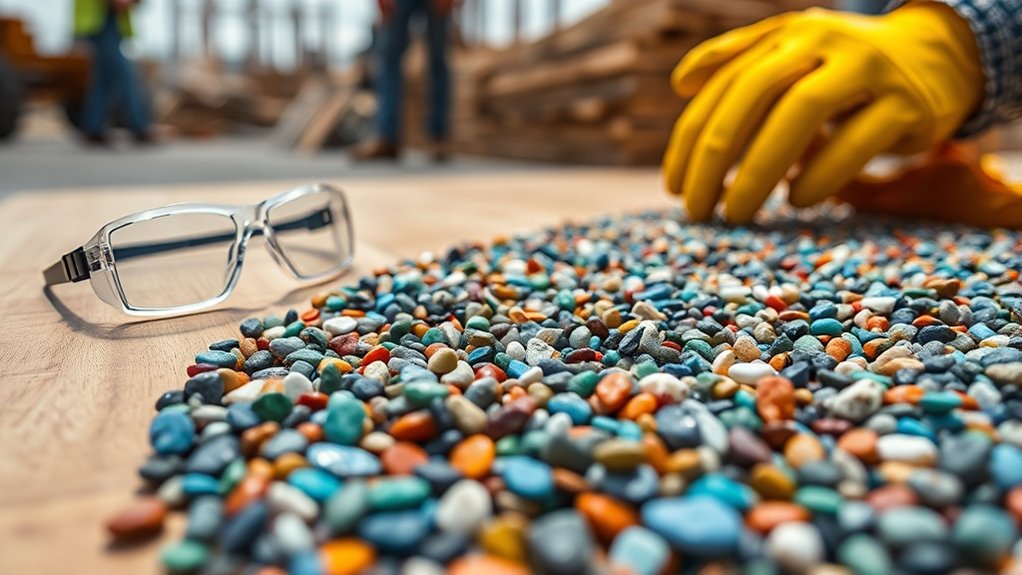
Choosing quality materials is essential for the durability of your resin-bound gravel installation. Aim for a resin-to-aggregate ratio of around 7%. Using too much resin can make the surface brittle, while too little can affect stability.
Opt for washed and kiln-dried aggregates, ideally sized between 1-10 mm, to improve bonding and prevent moisture problems. Mixing different aggregate sizes can enhance the strength and interlock of the surface.
Select UV-stable polyurethane resin for lasting colour and flexibility, ensuring it’s compatible with your aggregates. Always source materials from certified manufacturers to guarantee they meet performance standards.
Maintaining Surface Safety and Performance
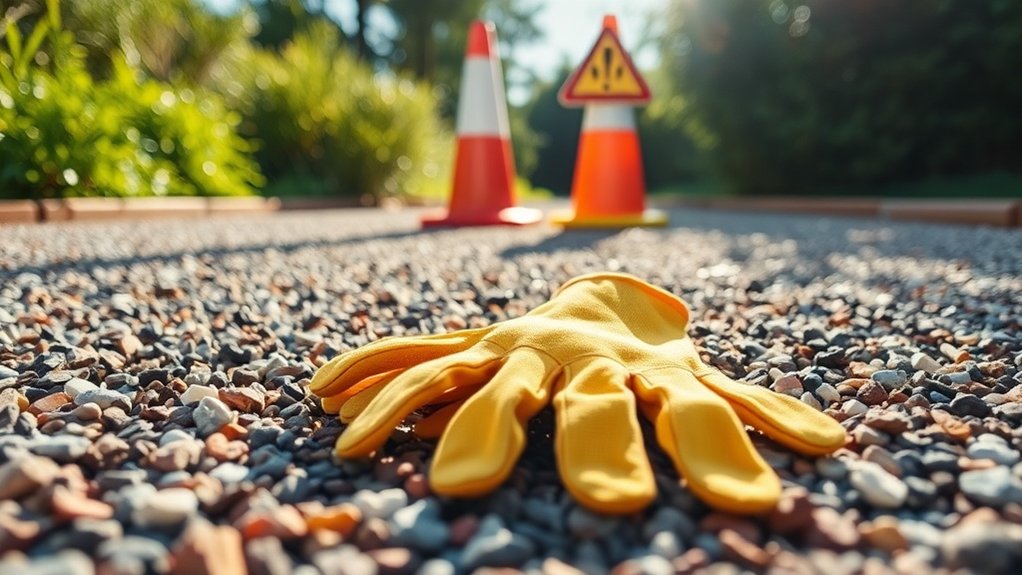
Maintaining the safety and performance of your resin-bound gravel installation is crucial for its longevity. Regular upkeep not only enhances appearance but also ensures safety.
Here are some straightforward cleaning tips:
- Sweep regularly with a stiff broom to keep debris at bay.
- Remove leaves and organic matter promptly to prevent drainage issues.
- Use non-metal blowers for larger areas to protect the aggregate.
- Gently pressure wash at no more than 150 bar, keeping nozzles at least 20 cm away to clear grime.
Additionally, avoid contamination from solvents and heavy objects, and manage loads carefully to prevent surface damage.
Regular Audits and Inspections for Compliance
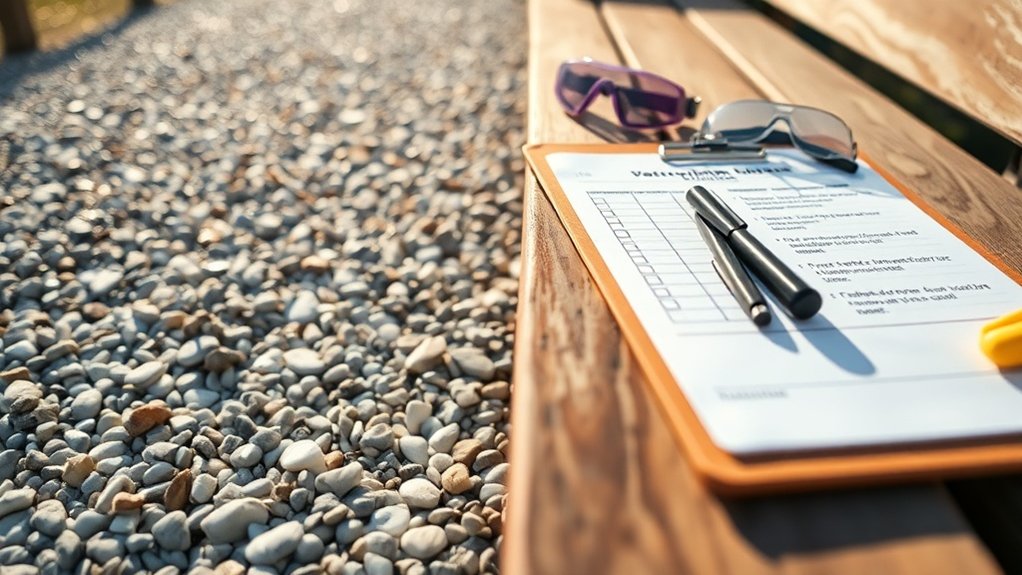
Regular audits and inspections are essential for ensuring compliance with safety regulations in resin-bound gravel installations. By implementing structured audit processes and maintaining a regular inspection schedule, you can meet industry standards and enhance safety.
| Audit Focus | Inspection Focus |
|---|---|
| Quality of Materials | Structural Integrity |
| Compliance with REACH | Debris Removal |
| Installer Training Updates | Crack Detection |
| Documentation Maintenance | Surface Sweeping |
Conducting audits every quarter helps verify compliance, while visual inspections can catch defects early. By keeping thorough records, you can monitor improvements and rectify any regulatory issues before they become serious. Prioritising safety through proper training and adherence to protocols is crucial during these evaluations.
Effective Management of Environmental Risks
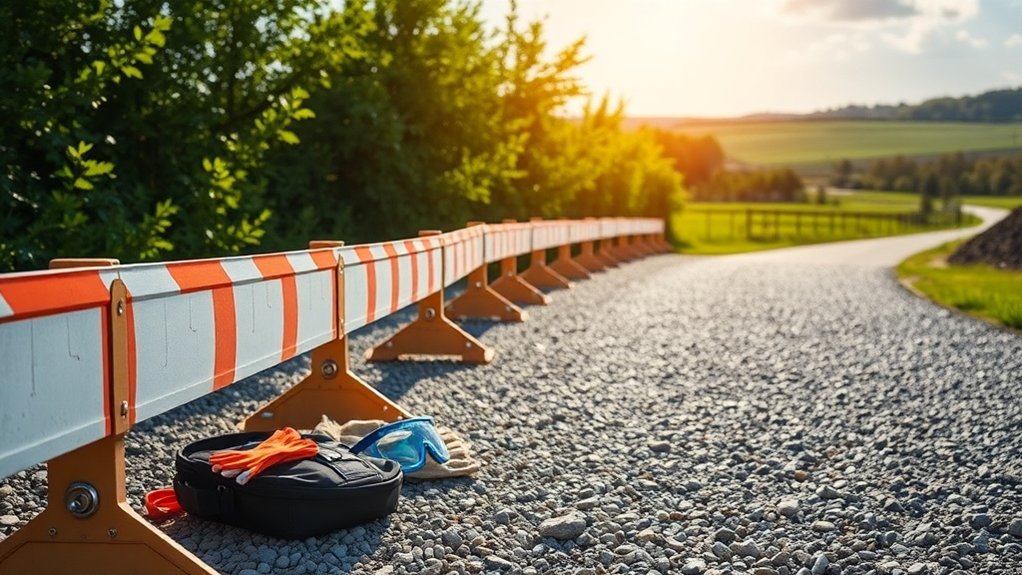
Managing environmental risks might seem daunting, but effective strategies for resin-bound gravel installations can significantly reduce their impact.
Here are some essential points to enhance sustainability and strengthen your risk management:
- Permeability: Ensure your surface allows rainwater to drain effectively, which helps to reduce urban flooding and recharge groundwater supplies.
- Sustainable Materials: Incorporate at least 25% recycled aggregates. This not only decreases your environmental footprint but also cuts down on transport emissions.
- Durability: Choose high-quality, UV-stable resins that prolong the lifespan of your installations, thereby minimising waste.
- Maintenance: Regular maintenance keeps surfaces in optimal condition, which reduces resource use and pollution.
Frequently Asked Questions
What Are the Costs Associated With Resin-Bound Gravel Installation?
Resin-bound gravel installation costs typically range from £6.08 to £17 per square foot, depending on material prices and the complexity of the project. For an average driveway, you can expect total costs between £4,400 and £9,800, varying with your design choices.
How Long Does Resin-Bound Gravel Typically Last?
Resin-bound gravel is reliable, generally lasting between 15 to 25 years. With proper upkeep and care, you could see it last as long as 30 years. This makes it a practical choice for driveways and pathways, combining durability with aesthetic appeal.
Can I Install Resin-Bound Gravel Myself?
Yes, you can install resin-bound gravel yourself. Make sure to follow safety precautions, such as wearing protective gear, and prepare the surface carefully. DIY installation demands attention to detail for the best results and long-lasting durability. For example, ensure the base is clean and even before applying the resin.
What Maintenance Is Required for Resin-Bound Surfaces?
To keep your resin-bound surface looking its best, regular maintenance is essential. Simply sweeping, hosing down, and pressure washing when necessary will help ensure its longevity and appearance.
Are There Color Options for Resin-Bound Gravel?
Yes, there are plenty of colour options for resin-bound gravel, providing excellent design flexibility. You can select from natural shades, contemporary greys, or even custom mixes, ensuring your project meets both aesthetic and practical requirements.
Conclusion
Ensuring safety in your resin-bound gravel projects protects both your team and the users who will walk on these surfaces. By adhering to safety regulations and standards, you can guarantee a slip-resistant and durable finish. Conducting regular audits and using quality materials are essential steps that enhance the longevity and safety of your installations. When you follow these practices, you’re not just meeting requirements—you’re creating spaces where people can feel secure and at ease.
